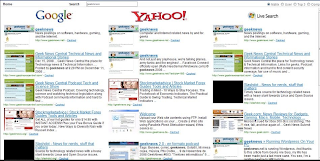 |
| http://bit.ly/XBxSSx |
So, how do you know which Search Tool to use? The best advice is to get to know all of the search tools by using them and becoming more accustomed to their features. This way, you’ll know what will work best for you and when. Some qualities to look for are ease of use along with quick and relevant results. I’ve heard the word “query” before and always thought it meant search, but the book defines a “search query” as “… a question that defines the information you seek.” (113) Queries should contain “keywords” or something specifically describing what you’re looking for. These keywords can be typed in a “search text box” which will yield a “search results list”. This list will have URL’s, descriptions, and links to appropriate Web pages based on the keywords entered. “Each Web page item listed in a search results list is called a hit.” (114) If more than one keyword is entered, most searches will return “hits” containing all keywords, but you cannot assume this will always happen or that the keywords will be close enough together to make a difference. Using quotations around keywords may help as will using as many keywords as possible (though search results with and without quotation marks may vary).
There are several different types of searches. A targeted search is going to look for a specific result using keywords like “cafes in the Sahara Desert” and should yield limited results. An open-ended search is more widespread and uses only one keyword like “desert” and will yield thousands of possible results. There are natural language searches available as well. These allow you to search with a statement or question like “Are there cafes in the Sahara Desert?” Natural language searches pass over things called stop words which are words like who, what, where, the, of, etc. It is recommended that one reviews a search engine’s FAQ or Help page to see the best way to query.
While some search tools list results in order of relevance, others have someone who decides the relevance and therefore, the order of “hits”. Still others have “sponsored listings” companies have paid for which are close to the top of each page. So how do you know which ones are the right results or the most reliable? You should first verify the validity of the content. Figure out who is the owner or sponsor of the Web page and/or site and if this owner is knowledgeable or qualified to comment on the information by looking into their background. The best results come from something called a primary source or some type of data providing “first-hand information about a particular topic.” (117) You also have to make sure you’re not relying on biased or opinionated sources. Shelly and Campbell suggest we evaluate the scope or depth of detail on any given Web page by comparing several different pages pertaining to the same topic. Things like poor grammar, misspellings, messy layouts, and broken links can mean poor quality. On the flip side of that, a nice looking Web page doesn’t necessarily mean the content is legitimate.
 |
| Dogpile MetaSearch |
 |
| www.geeknews.net/images/2008/12/umibozu1.jpg |
A Directory or “A human-compiled, hierarchical list of Web pages organized by category…” (118) may be useful as a search tool since it organizes links into categories that are easy to follow. Some directories will have a breadcrumb trail like ANGEL does. This makes it easy to navigate without having to use the back and forward buttons. Search engines (like Google) are what I’m most familiar with. Unlike directories, search engines collect data using software (spider, bot, or Web crawler). This software “… browses the Web, automatically adding the URLs and other information about Web pages to a searchable index.” (124) Web crawlers are usually scanning for things like page title, URL, keywords, links, etc. This information is put into an index (like at the end of a book) and stored. There is also what’s called a metasearch engine which “… is a special type of search tool that complies the search results from multiple search engines into a single search results list, effectively performing multiple different searches at once.” (129)
Please see additional blog posts for information on spiders, Web crawlers, Boolean operators, and advanced searches.
The browser’s QuickPick menu is another neat feature that appears when you click in the Address box and start typing. You may get several different results from several different sources. There should be a default search engine in the QuickPick menu but you can add (and remove) additional search engines if you choose to.
 |
| http://i.technet.microsoft.com/dynimg/IC339327.jpg |
There are specialized searches too. You can look for people and businesses by searching in the white or yellow pages directories. You can look up current events and news online at many various sites (some corresponding to their respective TV and radio channels). Video searching is available, along with social media, shopping, and many others.
What resources are available instead of search engines? Depending on the type of research you’re doing, search engines may not be the best option. Shelly and Campbell explain a few “… specialized collections of electronic resources.” (156) LexisNexis “… offers a Web-based interface to find abstracts and articles on business, news, government, medical, and legal topics from a vast database of information.” (157) Hoover’s and Dun & Bradstreet can be used to research businesses. FindLaw is used for legal research. Government resources are also available and recommended.
I thought I knew what I needed to know about search tools, but I guess I was wrong. I barely had a handle on search engines……
Work Cited:
Shelly, Gary B., and Jennifer T. Campbell. Discovering the Internet. Fourth ed. Boston: Course Technology, Cengage Learning, 2012. 112-159. Print.




No comments:
Post a Comment